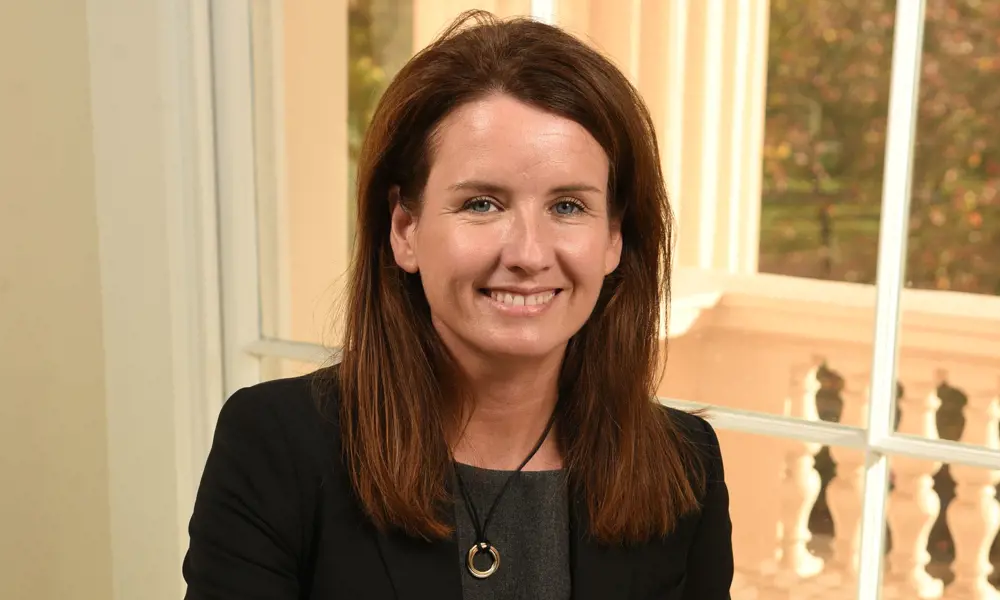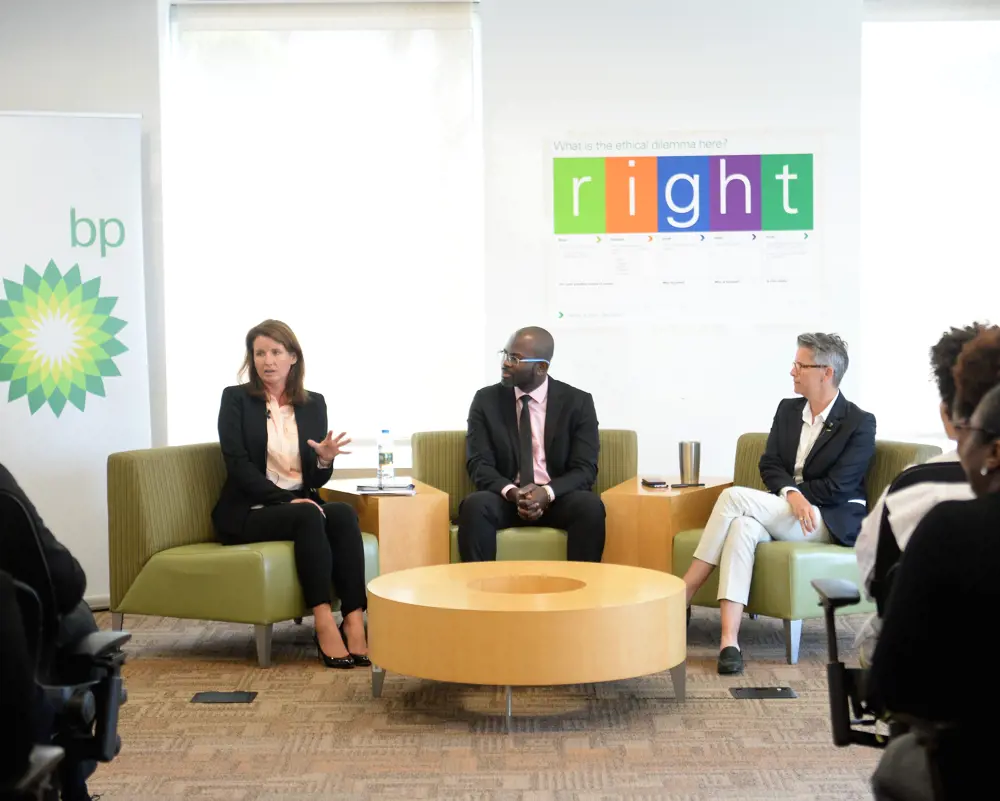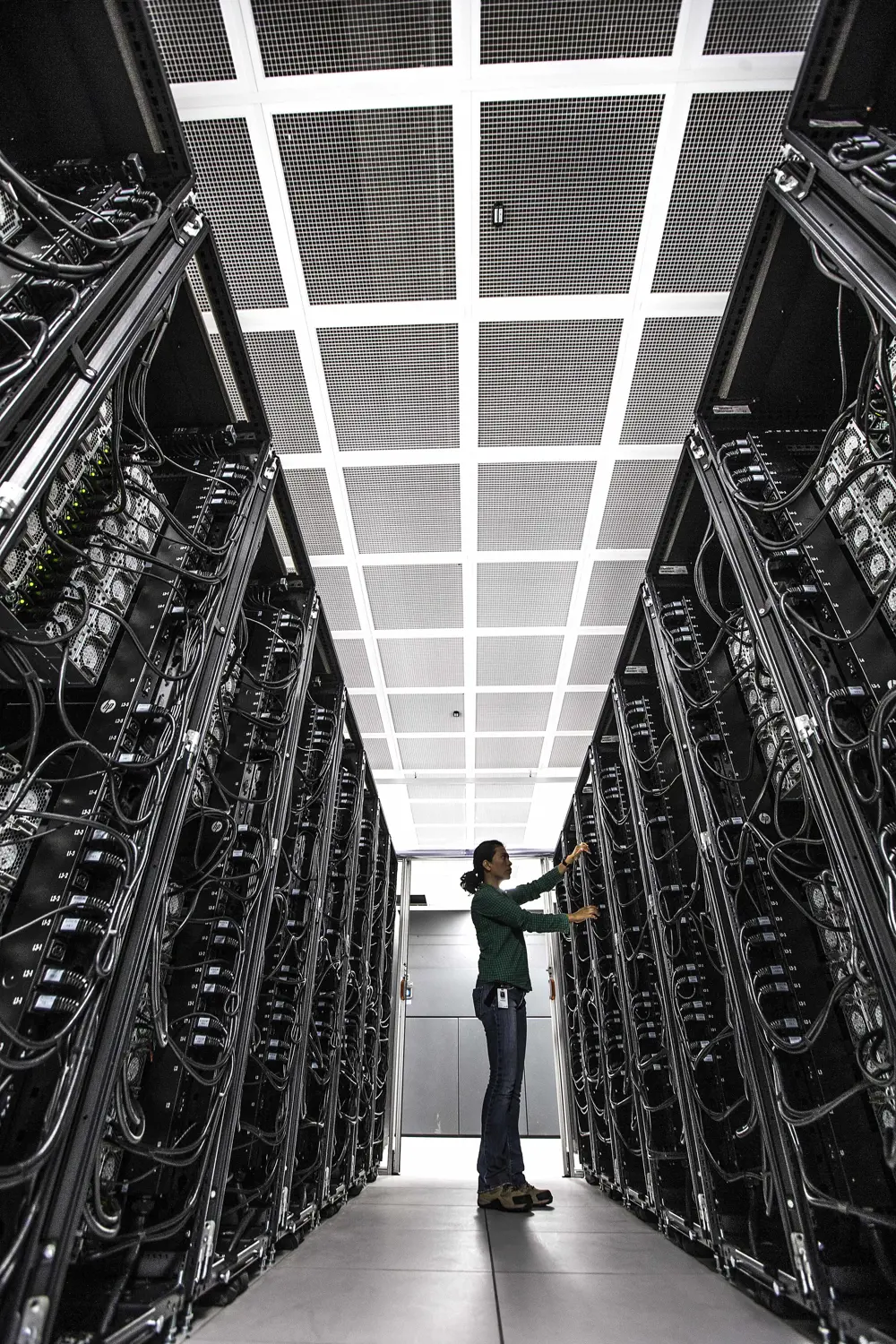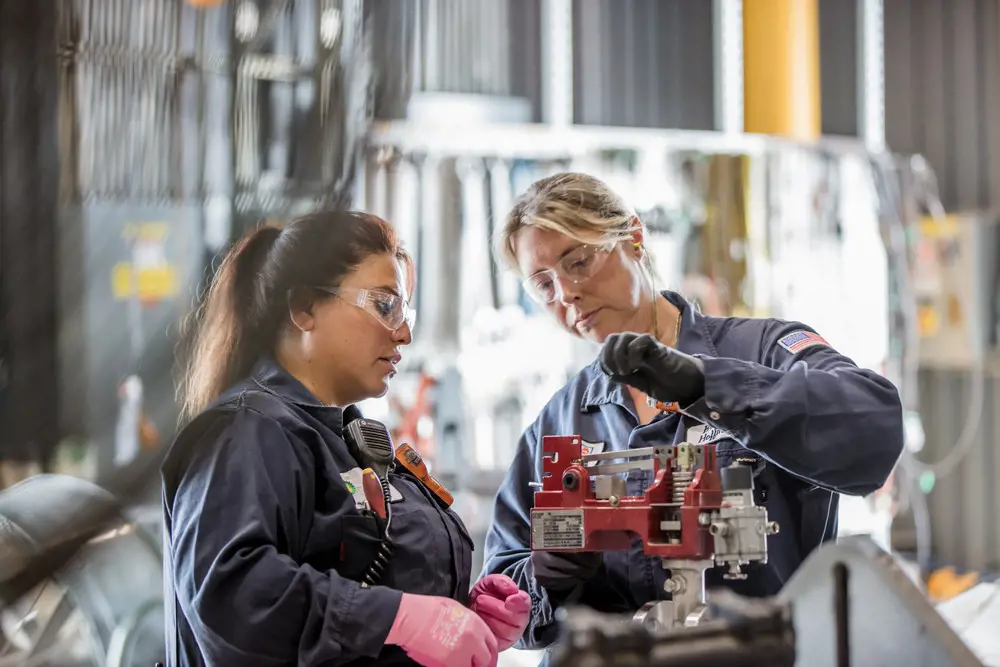
A vital link in the chain
It was a close shave for Leigh-Ann Russell FREng. Her parents were delighted when she landed what seemed like an ideal first job for a 16-year-old. “You can imagine: on a council estate, getting a job in the Bank of Scotland in Aberdeen, a really prestigious bank. It was just everything to my parents.” Six months into her ‘dream job’, Russell received “surprisingly good” exam results and had second thoughts about how she would spend her working life. She told her family that she wanted to ditch the secure bank job and to go to university. “They thought I was ridiculous,” Russell laughs. “Then I told them that I wanted to study engineering. They thought that was even more foolish.”
As Russell recounts it, the family response was: “Why would you want to give up your job in the bank to go to university?” No one else in the family had gone to university. This was followed by “engineering is not for women”. Her parents may have been shocked at first, she says, but no one tried to stop her. “I never heard the words ‘you can’t do that’,” she adds. “Eventually my dad said, ‘well at least I will have somebody who can fix my car for free in the future. You should go for it’.”
When it came to choosing a degree course, Russell made a pragmatic choice. “I looked at all the options available for me and picked engineering because it wasn’t narrow. Engineering allowed me to keep my options open.” The fact that careers in STEM paid well also helped sway her. “When you come from an environment like I grew up in, being able to lift yourself out of poverty and help your extended family financially has been one of the most wonderful things.”
I looked at all the options available for me and picked engineering because it wasn’t narrow. Engineering allowed me to keep my options open
Russell’s move into engineering started with a degree at the University of Aberdeen. In the 1990s, the city had two main industries: fishing and oil, a sector with engineering at its core. The university was also a centre for research and training in oil and gas. With her degree completed, Russell went to Schlumberger, a leading player in oil-field services and equipment, where she completed a graduate training programme while working on field operations. There followed a sequence of increasingly senior engineering roles before she joined BP in 2006, at the lower end of the engineering ladder.
When she was working in the North Sea with BP, Russell discovered similarities between a job in oil and gas and fishing. “I saw my grandfather, who was a cook on a fishing boat, and heard his stories. It didn’t seem very appealing, being out in the elements on the North Sea, being hit by waves. Then I ended up going into oil and gas where I was off on platforms in the middle of the North Sea being hit by waves,” Russell says with a laugh. “But at least we had really nice survival suits and warm clothing.”
Russell worked as a completion engineer on various projects. “The drillers make a hole and find oil and gas. The completion engineers remove it from the ground as safely and efficiently as possible.” Russell rose through the ranks, spending five years leading engineering, operations, process safety, and strategy and performance for BP’s $5 billion drilling business, at a difficult time for the oil industry. After 20 years at the heavy engineering end of the oil and gas business, there was a dramatic change in Russell’s role.
Moving upstream
In 2018, Russell took charge of the supply chain for BP’s upstream operations, which finds oil and gas and puts in place the infrastructure needed to bring it to the surface. Asked what the Head of Upstream Supply Chain does, Russell says “we procure and deliver all our company’s goods and services in a safe, ethical and reliable manner”. This means that she has responsibility for $20 billion a year and a staff of 900 around the globe. “I have learned a lot in this role,” she says, “stepping out of mainstream engineering after two decades. It is really a very commercial role, but also a technical role, because you are buying products and services that supply a high-hazard industry.”
Engineers don’t usually end up in charge of supply chains, Russell admits, but they may now be much more familiar with the role in the wake of the COVID-19 pandemic and all the talk of laying hands on personal protective equipment (PPE). In Russell’s case, she suddenly found herself reading up on PPE. “Initially our supply chain was engaged heavily in purchasing equipment for emergency services.” As it swung into action, BP asked her to lead an executive steering committee looking at the company’s response to COVID-19. “Supply chains typically would not be sitting at the emergency response committee in oil and gas companies,” she explains. “But it was recognised that we could play a vital role on many fronts.”
BP’s supply chain teams around the world moved to provide local support. UK efforts involved buying masks for the NHS, for example. Then there was the challenge of maintaining security of supply in BP’s oil and gas operations, with factories in China and Italy closing down at the start of the pandemic. Throw into this a chaotic energy market and “it is a brutal environment for oil and gas companies”, as Russell puts it. “It has had an even harder effect on our supply chain than it had on oil and gas companies themselves.”
Russell is full of praise for the response to the pandemic of the far-flung network of BP people, often working from home in difficult conditions. “I am really proud of what our company, and also the supply chain, has been able to do across those multiple fronts.”
We now have to continue to provide that product – heat, light and energy – but we have to do it in a cleaner way

Leigh-Ann speaking at a BP networking event © BP
There is no hint that Russell feels that she has joined a 20th century industry that is on its way out. Sure, climate change looms large over fossil fuels, but that does not mean the end of the energy industry. “When you look at the energy transition, and what the world needs for energy, we have an even bigger role to play in society. We now have to continue to provide that product – heat, light and energy – but we have to do it in a cleaner way.”
One sign of the revolution that has hit the fossil fuel industry came earlier this year when BP’s new CEO, Bernard Looney FREng, unveiled the company’s ambition “to become a net zero company by 2050 or sooner, and help the world get to net zero”. Eliminating greenhouse gas emissions will not mean an end to oil and gas, she insists. “We still have a product that is needed in society,” Russell explains. But it has to be produced and consumed in a carbon neutral way. Engineers will need all their skills to make that happen. For example, reducing emissions means “making sure that gas stays within the pipeline and that we detect leaks as quickly as possible”. BP now deploys drones, crawlers and other innovative technologies to make the product cleaner. “While we are doing an amazing job in getting the renewable side of our business going and investing and creating new businesses, reducing our carbon emissions from our existing businesses becomes really critical as well.”
This draws Russell into explaining new areas of engineering and the symbiosis of information technology and ‘hard hat’ engineering in oil and gas operations. When she joined the industry, it was beginning to deploy acoustic technology. As they drill a well, engineers run an optical fibre along the pipeline. “This is thousands of kilometres under the seabed, with wet connections between different pieces of pipe.” This is in a high-temperature, high-pressure environment. The completion engineers then use sensors and the fibre optic link to listen to oil and gas as it comes out of the ground. “We have built an algorithm that tells us what is happening along the length of this wellbore. It is hugely reliable.” The system reveals when and where oil and gas are coming from and if water or sand enter the pipe, which can damage an oil and gas well. Knowing what is going on, the operations engineers can go into the well and intervene in what is happening. “This is all done in a tiny piece of fibre with a really amazing algorithm,” says Russell. “This is BP proprietary technology. Our engineers were the ones who did this. It is just phenomenal.”
Technology like this will be essential in the pursuit of net zero. “That data allows us to massively optimise the production that we get from that well. Drilling a well takes a lot of money, but it also has an impact on the environment.” Optimising how much oil and gas reservoirs deliver means fewer wells can be drilled. This technology can also help optimise oil and gas production on a larger scale. “If you bolt on to that a data platform that has all of the data from all of our wells around the world, you can start to play all kinds of different games with optimising production.”

Data analysis is among the newer forms of technology that BP is employing to ensure its operations remain efficient © BP
Think like an engineer
Russell is a great believer in assembling teams with diverse skills. As a ‘digital native’, educated in an era when computing and IT were a constant presence, she can see the benefits of blending it with the rest of engineering. “We have had a lot of digital talent join the organisation. But there is also a massive role in upskilling our individuals to be able to do both.”
As Russell sees it the key is giving people digital skills. People don’t need to be data scientists, she insists, to be able to exploit IT. “Some of our engineers are teaching themselves coding: that amazing combination of digital skills and engineering expertise has led to some quite phenomenal projects.”
What matters, says Russell, is the engineer’s way of thinking. “Adapting to situations is at the heart of being an engineer and what we are inherently good at. Give us a problem and we will solve it. There are lots of problems in the world today.”
What does an engineer make of the new world of running supply chains? “I discovered that having supply chain professionals and engineers working together to get the right outcome is really important. The supply chain professional might not really understand the technical side of things, but most of our engineers don’t have that commercial skill.” One reason for dropping an engineer into supply chain management is that it prompts the business’s engineers to think about how their decisions affect their counterparts in their suppliers. “We work with companies that are absolutely amazingly world class,” says Russell. “We have gone to some of our partners and said ‘We keep telling you how to do this, is there a better way?’”
Supply chains will also be crucial in BP’s pursuit of net zero. “It is impossible to achieve what we want to do without bringing our supply chain along,” says Russell. Around 60% of BP’s spending goes into the supply chain; it also accounts for around 80% of the people employed on the company’s behalf. “If you don’t understand the impact that your supply chain has on the environment, then you are just not going to be successful at all.” In turn, suppliers must also take the message onboard. It is BP’s job, she says, to get suppliers to understand where they can play a part.
If you don’t understand the impact that your supply chain has on the environment, then you are just not going to be successful at all
Working in supply chains has certainly taken Russell in interesting directions. Another lockdown activity involved calls to the chief operating officer of a major supermarket, which is one of the UK’s biggest supply chains. “The problems that we have as engineers are similar whatever sector you are in right now.” BP also has a partnership with Amazon Business Services, “looking at a different way of buying products that is more efficient and easier for our internal customers to use”, she explains. “If you had told me ten years ago that I would be working on projects with Amazon I would not have made that connection.”
Russell might also have been surprised that an oil company can also benefit from talking to medics. In another lockdown activity, Russell has been talking to someone she mentors in the medical sector. “She was telling me about digital advances in the medical sector that are happening right now as hospitals strive to work differently under COVID-19. I learned about a few things that we might be able to do in oil and gas because of that conversation.”
This line of thinking takes Russell into a key area for her, the importance of diversity in general. Her line is that teams need diversity. “Engineers don’t know everything,” she confides. “The things you can learn from different skillsets and different mindsets just takes a business to a different level.” A couple of decades ago, she continues, whatever the engineers said went and engineers got all the management jobs. “I don’t think that is healthy in terms of growing businesses.”
Career timeline and distinctions
Born, 1975. BSc Engineering, University of Aberdeen, 1997. Joined BP, 2006. Houston Business Journal 40 under 40, 2014. Head of Upstream Supply Chain,2018. Fellow of the Energy Institute, 2018. Fellow of the Royal Academy of Engineering, 2019.
Refinery engineering technicians at BP
Russell is passionate about having a diversity of people working in the organisation. Clearly having a good mixture of women in a team is high on her agenda, but beyond that teams perform better if they bring together people with different skills and ways of thinking. “That isn’t necessarily about being female; someone might have a different ethnic background, or it could be someone who comes from a council estate versus Eton.” However, the role of women in engineering is clearly high in her thinking.
“Some women think it is not a woman’s problem, it’s a society problem. I 100% agree,” she stresses. “Women are not going to fix diversity. Men are going to fix diversity because they hold the positions of power. I get that.” Her reason for taking a public stand is that “it is just about seeing somebody who looks like you”.
In Russell’s case, few people share her background. “Growing up on a council estate in the north-east of Scotland, becoming an engineer was a risky option for me personally.” She is determined to show other young people that it is possible. “I want young women to see that you can wear a dress and heels, and you can still be an engineer because it is a wonderful career opportunity. I have absolutely loved every single day of my – not every single day, that’s not true – but I love my job.”
We know that having that mix of men and women and a mix of backgrounds is what makes companies really successful. That doesn’t need to be debated any more

Leigh-Ann Russell emphasises the importance of ensuring that the engineering pipeline has enough diversity in it to change the demographics of engineering © BP
Russell has risen to the upper echelons of engineering and wants to encourage others to follow in her footsteps. Again, the challenge is something of a supply chain imperative. But without enough women or other minorities in the pipeline, she says that the demographics will never change.
It is also a national imperative, says Russell. “We will not be successful in this country without engineers. We will not be successful as engineers unless we bring in young talent. I worry about the dearth of talent that we will attract unless we make a concerted effort. It must be diverse talent. We know that having that mix of men and women and a mix of backgrounds is what makes companies really successful. That doesn’t need to be debated any more. There are a million studies that show that companies with diversity are stronger financially, less likely to go bust. We don’t need to keep telling people that.”
Russell cites BP as an example of what can be done to encourage diversity. “Nearly 30% of our senior leaders are women: 25% of our most senior executives are women. In an oil and gas company I think that is a radical shift.” The challenge now is to ensure that the global pandemic does not bring an end to recent progress. “I do worry that in an economic downturn we just forget. We are not taking our foot off the pedal [at BP] but we need to make sure that the supply chain doesn’t. It is not a ‘nice to have’. Diversity is what is going to make our country and company successful.”
***
This article has been adapted from "A vital link in the chain", which originally appeared in the print edition of Ingenia 83 (June 2020).
Contributors
Michael Kenward OBE
Author
Keep up-to-date with Ingenia for free
SubscribeOther content from Ingenia
Quick read

- Environment & sustainability
- Opinion
A young engineer’s perspective on the good, the bad and the ugly of COP27

- Environment & sustainability
- Issue 95
How do we pay for net zero technologies?
Quick read

- Transport
- Mechanical
- How I got here
Electrifying trains and STEMAZING outreach

- Civil & structural
- Environment & sustainability
- Issue 95